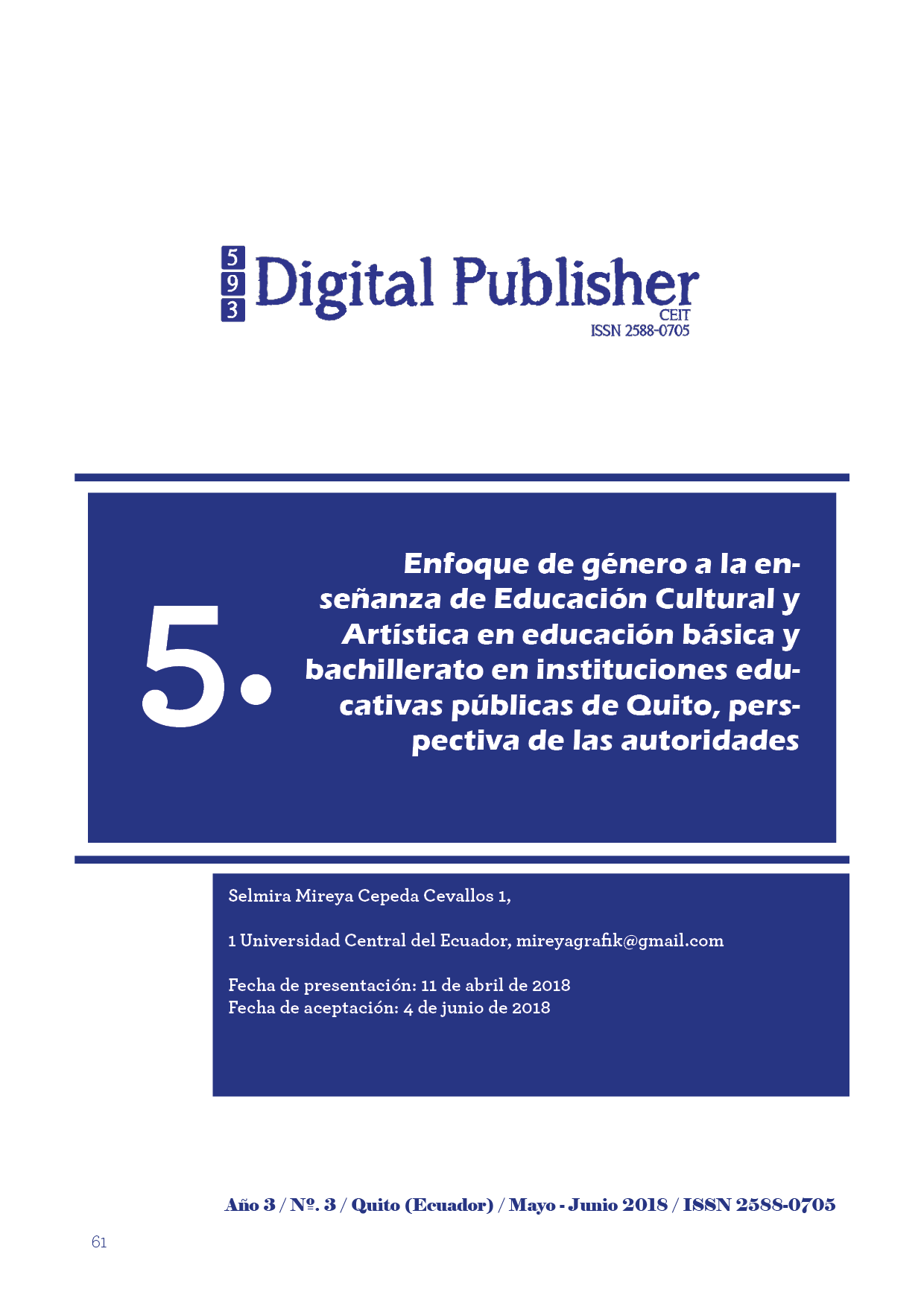Enfoque de género a la enseñanza de Educación Cultural y Artística en educación básica y bachillerato en instituciones educativas públicas de Quito, perspectiva de las autoridades
Main Article Content
Abstract
The purpose of this research work was to analyze the relationship between the gender approach and the teaching of Cultural and Artistic Education in elementary and high school education in ten public educational institutions of the city of Quito; the research was oriented to identify elements of the curriculum from the theoretical basis of gender for the study and analysis of the set of sociocultural attributes assigned to people from sex and that becomes a sexual difference of social inequality; the study process was framed in questions that were outlined to identify the information with the qualitative research through interviews with the authorities of the educational institutions selected for the research that allowed the analysis and discussion of results that allowed conclusions and recommendations according to the variables investigated, gender and education.
Downloads
Article Details

This work is licensed under a Creative Commons Attribution-NonCommercial-ShareAlike 4.0 International License.
1. Derechos de autor
Las obras que se publican en 593 Digital Publisher CEIT están sujetas a los siguientes términos:
1.1. 593 Digital Publisher CEIT, conserva los derechos patrimoniales (copyright) de las obras publicadas, favorece y permite la reutilización de las mismas bajo la licencia Licencia Creative Commons 4.0 de Reconocimiento-NoComercial-CompartirIgual 4.0, por lo cual se pueden copiar, usar, difundir, transmitir y exponer públicamente, siempre que:
1.1.a. Se cite la autoría y fuente original de su publicación (revista, editorial, URL).
1.1.b. No se usen para fines comerciales u onerosos.
1.1.c. Se mencione la existencia y especificaciones de esta licencia de uso.
References
Pedagogía coeducativa. (2011). Clave XXI, Reflexiones y experiencias en educación, Necesidad de una pedagogía educativa.
Constitución. (20 de octubre de 2008). CONSTITUCION DE LA REPUBLICA DEL ECUADOR 2008 . Quito: Editogram EP.
Educación, M. d. (2012). Marco Legal Educativo. Quito-Ecuador: Editogram.
Glosario, C. d. (2011). ¿Sabías que? Un Glosario feminista. Ecuador: Manthra Editores. Obtenido de catarina.udlap.mx/u_dl_a/tales/documentos/lco/hernandez_g_zz/capitulo1.pdf
Guerra, L. (2014). Tesis presentada para la obtención del grado. El feminismo socialista de Flora Tristán: Una. LA PLATA, Argentina.
Hendel, L. (2017). Violencias de Género, Las mentiras del Patriarcado. Buenos Aires: Paidós.
Lagarde, M. (1996). Desarrollo humano y democracia.
Lagarde, M. (2015). Claves Feministas para mis socias de la vida. Buenos Aires: Batalla de ideas.
Lagarde, M. (s.f.). Ponencia inaugural saludsexual y reproductiva. Obtenido de https://youtu.be/cXYw07CnwgE
Mineduc, M. d. (2016). Currículo de Educación Cultural y Artística. Quito: Medios Públicos.
Ministerio de Educación. (3 de Marzo de 2016). Guia-Metodologica-para-la-Construccion-Participativa-del-Proyecto-Educativo-Institucional.pdf. Quito, Pichincha, Ecuador.
Ñaupas-et-al-Mejía, N. (2014). Metodología de la investigación, Cuantitativa cualitativa y Redacción de tesis. Bogotá: ediciones de la U.
Rodriguez, M. (1992). Pedagogía crítica. Aula de Innovación Educativa.
Saravia, S. (2005). Género y Liderazgo: Perspectiva histórica. Mujeres en Red-Periodico Feminista, págs. 2-4.

